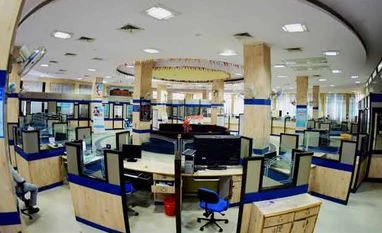The production of Coal India, which accounts for a little over 80 per cent of national production, was hit by 50 per cent. Its normal daily production is 1.7 million tonnes. “In most of the mines, there was attendance by 50 per cent of workers,” its personnel director, R Mohan Das, told PTI.
Banking transactions were severely impacted, as around 1.3 million workers, mainly from public sector banks (PSBs), were on strike. The unions claimed at least two million from public and private sector financial institutions didn’t come to work.
Reserve Bank of India (RBI) offices were fully functional, an RBI official said. Activities in the foreign exchange and money markets were smooth, dealers said.
There were demonstrations by thousands of banking and insurance employees at Jantar Mantar in the national capital.
Protests turned violent in parts of West Bengal where police resorted to lathicharge on union members who took to the streets. Nearly 200 people were arrested from different parts of the Trinamool Congress-ruled state (the ruling party was against the strike) after clashes were reported between Left and TMC workers.
The impact was most visible in some of the non-BJP states such as Kerala, Tripura, Karnataka and Odisha. Some impact was seen in Delhi, Haryana, Punjab, Tamil Nadu, Gujarat, Bihar and Jharkhand.
Commuters faced inconvenience in parts of Delhi, West Bengal, Kerala, Uttarakhand, Himachal Pradesh and Uttar Pradesh, as much of public transport was off-road.
The TUs claimed 150 million workers participated, which would make it the biggest-ever workers’ protest till date. In the previous strike in February 2013, 100 million workers had participated, the unions had claimed. The unions said there was no impact of the Sangh Parivar-supported Bharatiya Mazdoor Sangh (BMS) backing out. They said some of the
BMS workers, particularly in telecom and coal, were part of the strike.
However, the Union government contested the TUs’ claim that the strike was successful. “The impact of the strike call given by some of the central TUs has not been felt much in the most parts of the country as per information received from all over the country. The situation remained, by and large, normal and peaceful across the country. Most of the employees attended their offices,” said a release issued by the labour ministry.
The labour ministry said only seven out of total 12 central TUs participated in the strike. “It indicates that the workers want to settle their demands through dialogue and discussion,” the ministry said. The unions have called the strike mainly to oppose the labour law proposals of the government and non-fulfilment of their demands, particularly those related to minimum wages, contract workers and bonus. Business chamber Assocham said the disruption in essential services might have led to a loss of Rs 25,000 crore.
Union labour minister Bandaru Dattatreya left for Turkey to attend a G-20 countries’ labour summit on Wednesday. The two-day conference of ministers from across the world is to discuss issues related to labour, social security and job generation.
BMS, the second largest trade union in the country, is not participating in the strike as they were happy with the government's proposals. A group of ministers led by Finance Minister Arun Jaitley had held discussions with the trade unions to convince them.
However, the talks broke down as trade unions didn't accept the new proposals of the government. In the previous strike in February 2013, 100 million workers had participated, trade unions claimed. Apart from the BMS, National Front of Indian Trade Unions also didn't participle in the strike.
)